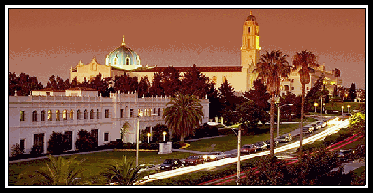Assignments
| Term Project |
Data Analysis Assignments | Extra Credit |
- Term Project
The
term project allows you to develop in-depth
knowledge of a particular aspect of urban
economics. Any one of the following approaches
can be taken:
- Research paper
This option involves
writing a paper of 10 - 15 typed, double
spaced pages. Footnotes and a
bibliography should be included, if
appropriate. You are free to choose any
topic that you wish to examine. Click here for some
possibilities. This can be an individual
or team effort.
- Applied projects
These are specific
research projects for local
organizations. I will develop some of
these projects through my local contacts;
if you have a connection to an
organization, you are free to propose a
project of your own. This can be an
individual or group effort.
- Alternative media
Possibilities here
include making a videotape or developing
a Website dealing with a topic in urban
economics. Please let me know if you can
think of other appropriate media. This
can be an individual or group effort.
- Community Service Learning
"Students
involved in service learning can bring
lasting benefits to the community while
enhancing their own education." -
President Alice B. Hayes (complete
article)
The term project requirement can be
met by engaging in community service with
an agency dealing with issues covered in
class. Arrangements have been made with
the following agencies:
Requirements for this option include a
minimum of 12 hours of service during the
semester, keeping a journal which
reflects on experiences at the
organization, and writing a short paper
relating the experience to the theories
discussed in class and the text. Click here for the
guidelines for the journal and the paper.
Students will also be expected to relate
their experiences at appropriate times
during class discussions.
Students are encouraged to choose an approach
and topic that best suits their interests and
goals.
- Extra Credit
The
field of urban economics is immense, and there is
not enough time in the class to deal with all its
nuances. Students wishing to explore some of
these nuances have the opportunity to earn extra
credit that would equal up to 10% of the total
grade in the class. Anything extra
that you do that increases your knowledge of
urban economic issues can earn you extra credit.
Some possibilities include:
- Second Term Project (10%)
A second term project can be
done for extra credit. The second project
must involve a different approach than
the first project. For example, if
Community Service Learning is chosen for
the first term project, a second
community service learing project is not
appropriate for extra credit. An academic
paper, an applied project, or the use of
alternative media would be appropriate.
- Book Review (10%)
Read an entire book dealing with
a topic involving urban economics. Submit
a typed report of roughly five pages on
the book’s contents. The book should
deal with a topic different than that
covered in your class paper, if you
choose that option for the term project.
There can be no duplications of book
reviews.The first person to propose a
book gets to do it. Some books you might
consider include:
- William Cronon, Nature's
Metropolis
- Anthony Downs, Stuck
in Traffic
- Joel Garreau, Edge
City
- Edgar Hoover and
Raymond Vernon, Anatomy of a
Metropolis
- Jane Jacobs, The
Death and Life of Great American Cities
- Jane Jacobs, The
Economy of Cities
- Edwin Mills and John
McDonald (eds.), Sources of
Metropolitan Growth
- Thomas Stanback, The
New Suburbanization
In addition, any book
listed in the bibliographies at the end
of each chapter is acceptable.
- Article Summaries (2%
each)
Read an
article dealing with a topic involving
urban economics. Submit a typed summary
of up to two pages of the article. Give
your opinion of the article’s
conclusion, if appropriate. If you do
multiple article summaries, each must
deal with a different topic. Any article
summaries must deal with topics different
than that covered in your class paper, if
you choose that option for the term
project. Only one person can submit a
summary of a particular article. The
first person to propose it gets to do it.
- Public Events (2% each)
Attend a speech, presentation,
or program dealing with an urban economic
issue. Submit a typed report of up to two
pages about what was said or done.
- Community Service (2%
each)
Volunteer
for an organization dealing with urban
problems, e.g., Habitat for Humanity, St.
Vincent DePaul’s. Submit a typed
report of up to two pages about your
experiences. As opposed to the Community
Service Learning option for the term
project, this is a more limited
commitment. Please visit the Associated Students Community
Service Learning website for some possible volunteer
opportunities. This option is not
available to those who choose the
Community Service Learning option for
their term project.
- Other
I will announce other
opportunities for extra credit as the
class progresses. They will be posted on
this site at that time. You are free to
propose activities of your own.
SimCity
Shopping
Centers
The credit values given above are
the potential points you can earn. The actual credit
awarded will depend on the quality of the work
submitted. Please get approval in advance for any
extra credit you attempt. All extra credit reports
are due by the last day of the semester.
|


